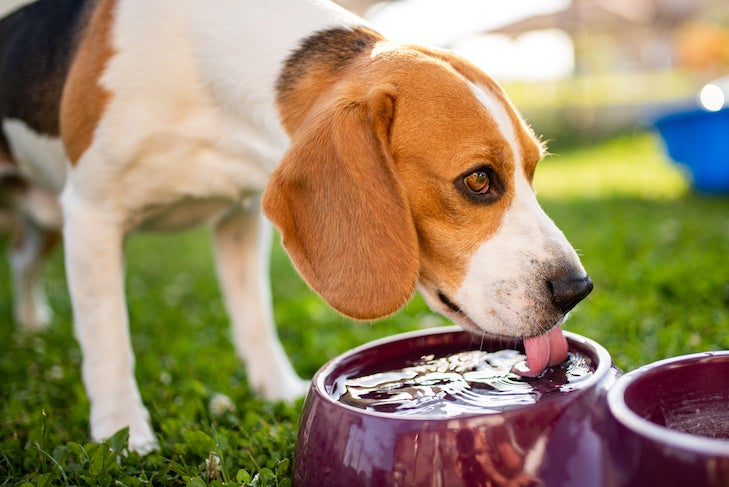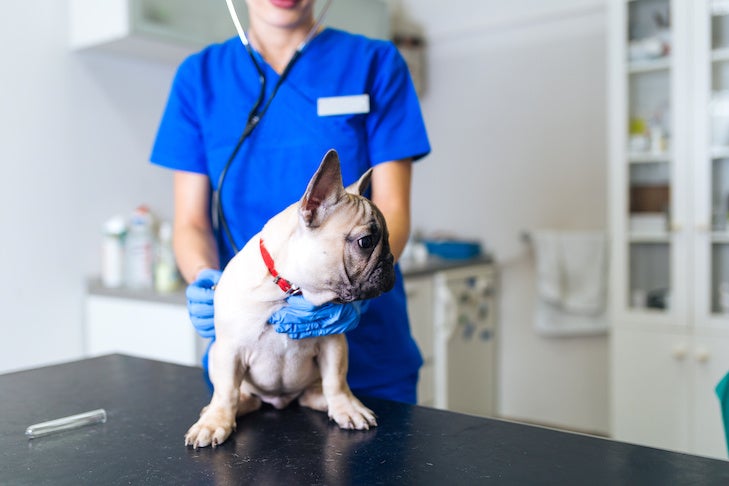
AKC is a participant in affiliate advertising programs designed to provide a means for sites to earn advertising fees by advertising and linking to akc.org. If you purchase a product through this article, we may receive a portion of the sale.
You know the modern-day mantra to stay hydrated. And that goes for your dog too. Make sure there’s plenty of clean, fresh water available, especially during hot weather. But is it possible for your dog to drink too much water?
As important as it is to avoid dehydration, there can be too much of a good thing. Many owners — and even some veterinarians — are unaware that an overabundance of water in a dog’s system can lead to frightening symptoms and even death.
What Is Water Intoxication?
Water intoxication goes by a variety of names, including water poisoning, hyperhydration, and water toxemia. No matter what you call it, this problem can come on suddenly, and the outcome can be fatal.
Here’s what happens when the body is overwhelmed with an excessive amount of water. First, sodium levels outside the cells are depleted, a condition called hyponatremia. In an effort to rebalance itself, the body responds to low blood sodium by increasing fluid intake inside the cells. Some organs, such as the liver, can accommodate the increased volume of their swelling cells, but others — in particular, the brain, which is encased in bone — cannot.

In humans, water intoxication usually results from drinking too much water after rigorous exercise or competing in water-drinking competitions. In dogs, excessive water intake often occurs when swimming, diving, or water-retrieving. Even play-biting the stream of water from a garden hose or sprinkler can overload a dog’s system and lead to water intoxication. Because their bodies have to work harder to clear out the excess water in their system, toy and small dogs are at greater risk than larger ones.
Symptoms of Water Intoxication in Dogs
Symptoms of water intoxication in dogs include:
- Lethargy
- Bloating
- Vomiting
- Loss of coordination (including stumbling, falling, or staggering)
- Restlessness
- Drooling
- Pale gums
- Dilated pupils
- Glazed eyes
As the pressure in the brain increases and its cells begin to die off, the dog may have difficulty breathing, develop seizures, or slip into a coma.
How to Treat Water Intoxication in Dogs
If you even suspect that your dog has water intoxication, get to a vet or emergency clinic immediately. Because water intoxication involves a lack of sodium, carefully replenishing that important mineral is crucial. Treatment includes the administration of electrolytes. (Moderation is key here, as super-concentrated sodium can cause severe neurological problems.)
Veterinarians may administer drugs such as Mannitol to decrease pressure in the brain, as well as diuretics such as Lasix, which help hasten the removal of fluid. In mild cases, a dog will have a staggering gait, but they can eventually recover internal equilibrium and return to normal. But in severe cases, the brain damage can be so advanced that it cannot be reversed, and the dog dies or must be euthanized.
Water intoxication has not been widely discussed in published veterinary literature and can be misdiagnosed as hypothermia or overexertion. Lower-than-normal sodium levels are a classic sign of water intoxication, but depending on when a vet runs lab work, a dog’s blood-sodium levels may have already started to stabilize, even though the cellular damage has been done.

What Dogs Are at Risk for Water Intoxication?
Cross-training in swimming pools can help improve conditioning and endurance, but it may put dogs at risk for ingesting too much water, too fast. And high-energy, high-drive dogs may have lower fat reserves and higher pain thresholds, prompting them to push through discomfort even after they’ve taken on too much water.
Ironically, because certain breeds were developed to spend a lot of time in the water, they may be less likely to swallow water while swimming. This might be due to the fact that these dogs have been bred to move through the water, creating as little surface disturbance as possible, in order to best do their work.
Prevention Is Key
Because water intoxication can be irreversible in advanced cases, prevention is key. Take note of your dog’s swimming style. If your pet tends to splash and holds their head low in the water, with their mouth open — even slightly — they may be at greater risk for water intoxication.
Don’t allow your dog to swim or retrieve in water unchecked, and make sure to take frequent rest breaks. In between swimming sessions, give your dog plenty of opportunities to relieve themselves, which helps remove excess fluid.
If your dog is a fetcher, avoid tennis balls and round-shaped toss toys, opting instead for a flatter object like a flying disc, which allows them to better close their mouth around it. Don’t allow them to dive for objects or bite at the high-pressure stream from a hose.
Now, armed with a little bit of knowledge, you can keep your dog safe while they make a splash.
This article is intended solely as general guidance, and does not constitute health or other professional advice. Individual situations and applicable laws vary by jurisdiction, and you are encouraged to obtain appropriate advice from qualified professionals in the applicable jurisdictions. We make no representations or warranties concerning any course of action taken by any person following or otherwise using the information offered or provided in this article, including any such information associated with and provided in connection with third-party products, and we will not be liable for any direct, indirect, consequential, special, exemplary or other damages that may result, including but not limited to economic loss, injury, illness or death.

